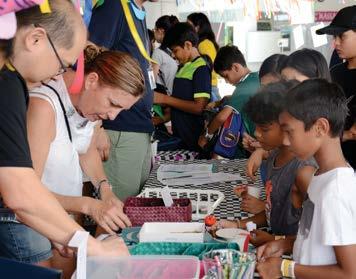
9 minute read
Service
LEARNING PROGRAMME: SERVICE
UWCSEA believes in the transformative nature of the experience of serving others and in the responsibility we have to one another and the planet. Our Service learning programme fosters empathy and helps students to recognise that part of being human is seeking opportunities to put yourself aside in the service of others.
While the context of each service interaction is different across our campuses, regardless of campus, grade, classroom or activity, all students are striving for learning in each of the three identified Service curriculum standards: 1. Awareness: by developing, skills and qualities, individuals can become determined global citizens who recognise their ability to enact positive change 2.Sustainable Development – Systems Thinking: individuals and groups can plan to engage effectively in the sustainable development of local and global communities 3.Taking Action – Being Changemakers: by taking informed, purposeful action, individuals and groups can act as changemakers, contributing to the sustainable development of local and global communities
STRATEGIC DEVELOPMENT: SERVICE LEARNING IN THE TIMETABLE In 2018/2019 Service was incorporated into the timetable in the Infant, Junior and Middle Schools across both campuses, with additional lunch and after school opportunities offered to students who wish to explore and extend interests that they identify personally with. The following anecdote illustrates the way in which Service Learning occurs as students are given the opportunity to identify natural links by being presented with case studies about concepts related to both the academic and service learning standards identified in the curriculum:
It’s a typical day in the Dover Campus Primary School (if there is such a thing), and K2 students are learning about ACRES, the Infant School Global Concern in connection with their Unit of Study ‘Feathers, Fur and Fins.’ With a focus on endangered animals, Mr Matthews, a Grade 4 teacher and ACRES volunteer, has visited the grade to speak to the students about the organisation, including its activities and challenges. Lucas happens to lose his tooth later that afternoon. Before bed, he writes a letter to the tooth fairy, “Dear Tooth fairy, can you please give me money to help ACRES Animal Rescue Centre?” The generous tooth fairy arrives that night and fulfills his wish. Lucas is able to give his tooth fairy money to ACRES.
This very neatly demonstrates the synergy between the Service and Academic curricula. And while the donation of Lucas’ tooth fairy money supported one of our Global Concern partners, we also have an ongoing commitment to our College and local Singapore Service projects. All three are integral to our written Service curriculum. In the High School our Service Learning curriculum develops into an intentionally facilitated programme that encourages students to become changemakers for the future in causes they feel most passionately about. Service in the High School takes place at lunchtime and after school.
LOCAL SERVICE BY THE NUMBERS
Staff hours 10,957
Dover staff hours 6,059 East staff hours 4,898
93,927 Total Service hours
Student hours 82,970
37,471 Dover student hours 45,499 East student hours
STRATEGIC DEVELOPMENT: IMPLEMENTING OPERATIONAL IMPROVEMENTS UWCSEA’s unique Global Concerns (GC) programme is a student-focused global service programme, enabling students to raise awareness and to take action in addressing human development and environmental concerns through their support of grassroots organisations. Our projects address the United Nations Sustainable Development Goals, providing opportunity, empowering communities and addressing social, economic, gender, education and health disparities.
The College began the 2018/2019 year with renewed framework for operations of the global service programme, following a review of fundraising, cash collection and disbursement concluded in the 2017/2018 year. This was particularly important for our Global Concerns programme as this allowed us to continue to deliver learning outcomes for students while developing and renewing our supportive partnerships with our service clients and partners in Singapore and overseas.
Global Concerns on Dover Campus 46
75 GCs and Focus Groups across College
Global Concerns and Focus Groups on East Campus 29
65 Partner organisations connected to our Global Concerns programme across College
Fundraising for Service All money raised at the College is independently audited annually.
Money raised by Dover Campus for the College Service programme S$494
S$625 Total money raised (in ’000)
Money raised by East Campus for the College Service programme S$131
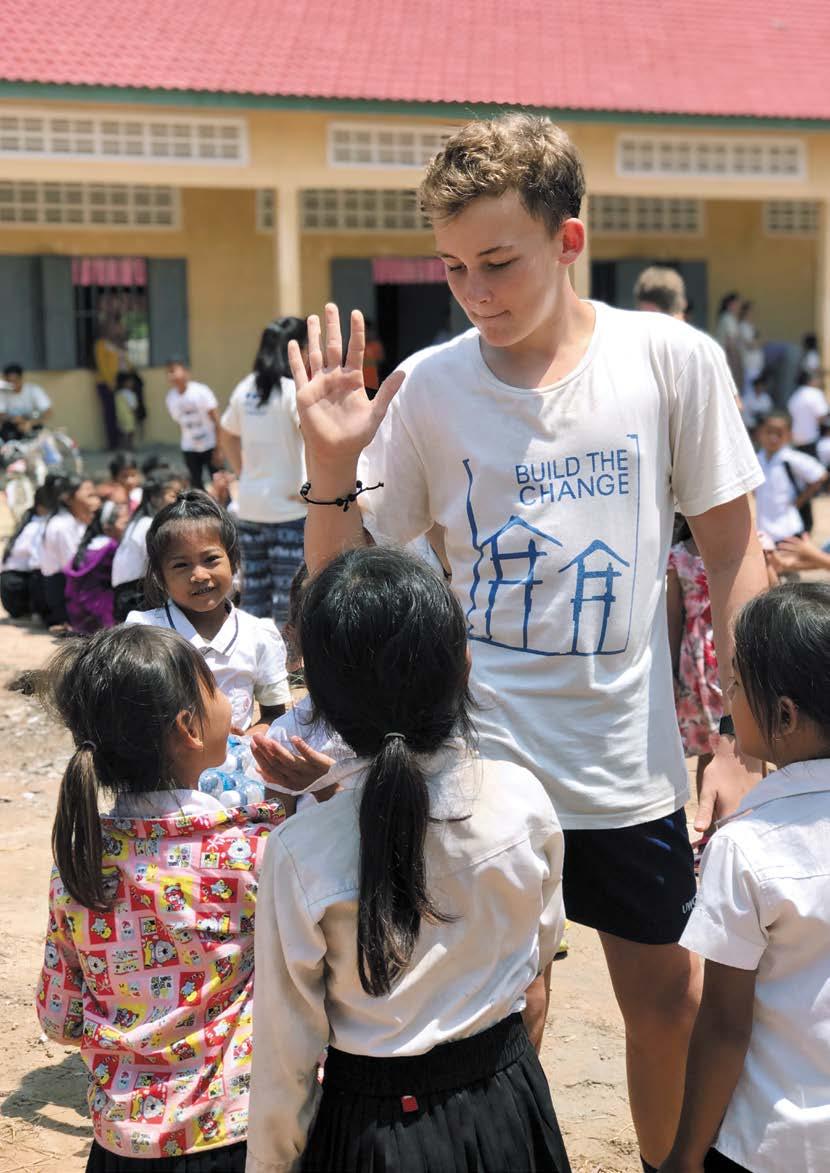
STORIES UWCSEA
Service in action
In 2018/2019, our Service programme embedded a systems-based five-stage service learning model, influenced by the work of Catherine Berger Kaye, across the College. Illustrated by the case study, learning emerges through the five-stage cycle of: initial investigation, intentional preparation, considered and purposeful action, reflection and, finally, demonstration.
A STUDENT JOURNEY WITH APEX HARMONY LODGE Opened in 1998, Apex Harmony Lodge is a purpose-built home for people in Singapore with dementia. While East Campus students have been regular volunteers since 2011, between 2016 and 2018 they continued to provide residents with positive experiences while also contributing to a study which aimed to understand the science of music therapy. Through the ‘Music with Reminiscence’ programme 33 students were trained in the Observed Emotions Rating Scale (OERS) and Personal Enhancers (PEs). For the 61 residents involved in the study, the results indicated a statistically significant increase in scores of positive emotions. For our students, there was a significant increase in their understanding of people living with dementia and the positive impact of music, and personal interactions more generally, on the elderly.
Students identify individual interests and skills they can offer to service partners. In this example, students may have musical skills, be interested in working with elderly patients or have personal experience of people living with dementia.
S t e p 2 : P r e p a r a t i o n Students receive training in any skills they need to be effective, e.g., OERS, mindfulness, body relaxation, personal enhancers, ways to show respect. They also learn about any restrictions on their activity e.g., compliance regulations and any legal frameworks that govern their interactions. D Using available data and understanding, students write their service goals, including setting measurable KPIs using a UWCSEA-designed framework and template. These are then mapped to the UN Sustainable Development Goals. E
A
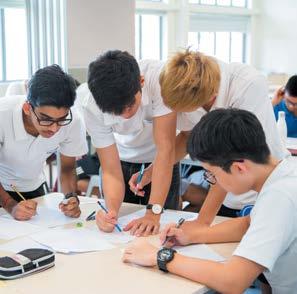
S t e p 1 : I n v e s t i g a t i o n
B
Students research the systemic issues that impact on people living with dementia and their families e.g., issues of inclusion, diversity, inequality and social integration.
C
Students visit Apex Harmony Lodge to conduct research, including interviewing staff, observing spaces and cataloging available resources. The data is used to inform the SMART goals that are set for the year.
S t e p 3 : A c t i o F Students visit Apex Harmony Lodge at least once a week, leading games and activities with the residents and, above all, listening to and making music with them.
At the end of the year, students review their goals and KPIs, obtain feedback from Apex Harmony Lodge staff and reflect on their journey, identifying questions and considering improvements for the following year. This reflection often leads to new action.
I
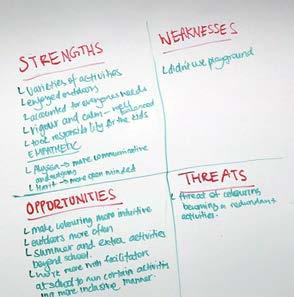
S t e p 4 : R e f e c t i o n
S t e p 5 : D e m o n s t r a t i o n
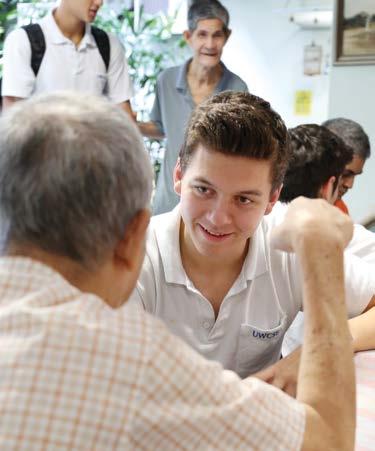
H
t i o n w i t h v a l u e , m e a n i n g a n d p u r p o s e G After six weeks, students complete a SWOT analysis which helps measure progress and to identify areas for improvement and additional support or training needed. Students then adjust the programme and implement any changes, watching for indicators of improvement. A second SWOT analysis is completed later in the year.
J
Students solidify their learning through demonstration: by sharing their stories in person and through multimedia such as blogs, news stories, learning journals, and presentations to friends, peers and family—all these raise awareness of the impact of service and inspire others to believe that they can make a difference in their communities.
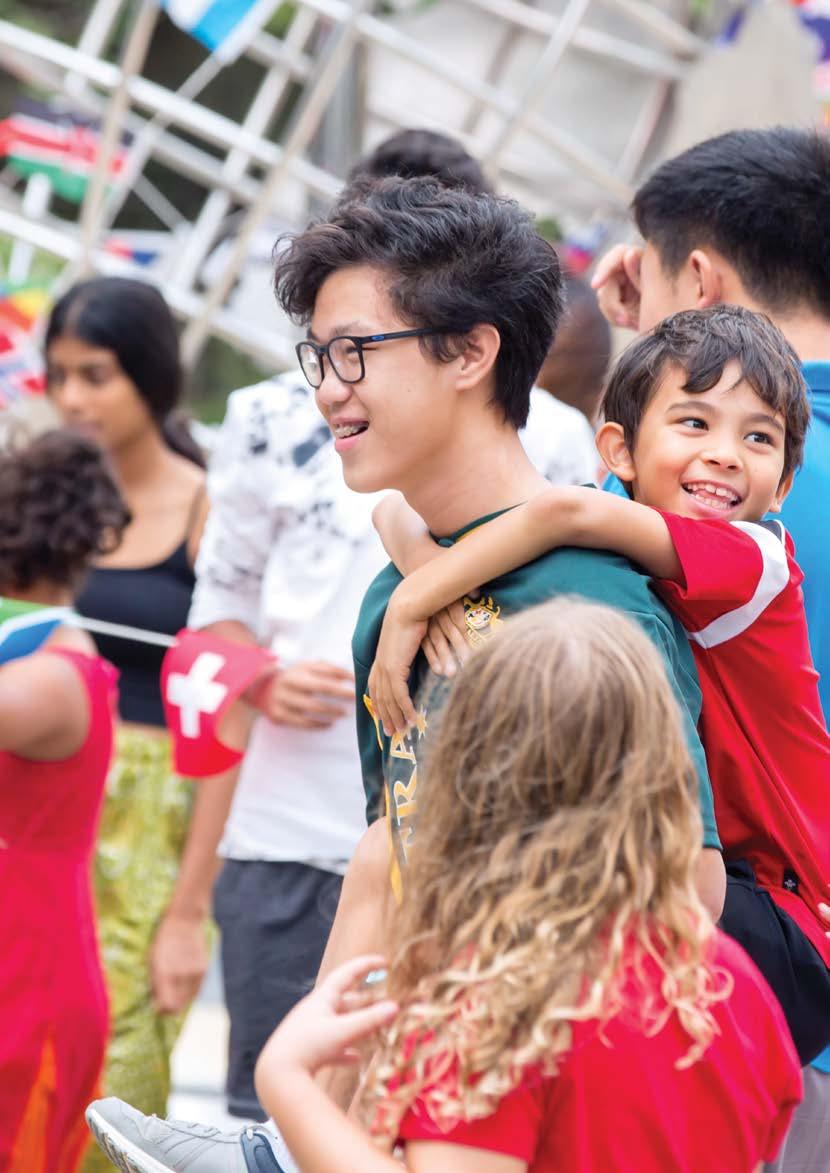
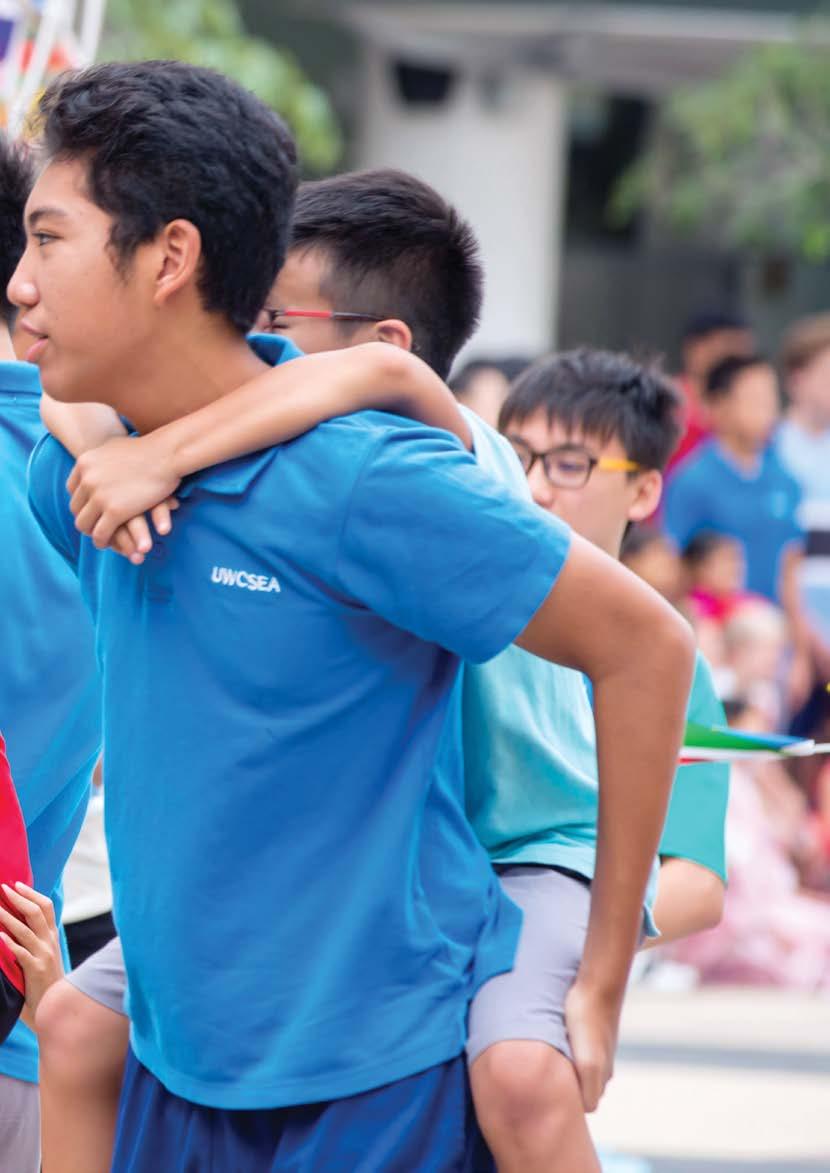
OUR COMMUNITY
The UWCSEA community is a vibrant, truly international group of students, boarders, scholars, staff, alumni and parents who are united in a common purpose. This section of the report provides some statistics and information about our community.
STRATEGIC DEVELOPMENT: ACTION FOR DIVERSITY The UWC mission compels us to strive for intentional and deep intercultural skill building. In turn, this drives our aspiration to have inclusive and equitable organisational learning environments and operational systems. It is because of this, the UWCSEA Strategy highlights diversity and inclusion as a strategic area of focus. As we began to explore how we might support diversity to flourish throughout UWCSEA in the future, the starting point was to engage with the members of our community to learn more about what aspects of diversity matter to them; in their roles as student, teacher, staff, parent, governor, alumnus - or likely, some combination of these roles. The ‘world café’ process, hosted on both campuses at the end of Term 2, created an opportunity to share ideas and contribute to outcomes through development of an Action for Diversity strategic plan for the College. The world café format of structured dialogue provided the means to elicit deep conversation. This was important at both an individual and a collective level as it allowed participants to deepen their understanding of their own and of one another’s perspectives.
What emerged from the two world café’s was fascinating, demonstrating first and foremost that diversity is valued by our community. Through dialogue, it was clear that diversity is complex. While one might initially think that an international school would focus on visual diversity such as nationality, race and gender, our community extends the thinking to embrace notions that include such things as cognitive, ability, language and political diversity. Several of our boarding students also pointed to the differences in experience between day students who may have grown up as ‘Third Culture Kids’ (TCKs) and scholars whose childhoods are firmly rooted in their family’s culture. Our scholars are selected in part because of their ability to contribute to cultural diversity, but their cultural identity is different from our TCKs in ways that may not be immediately obvious. This adds to the intricate tapestry of student diversity at UWCSEA.
A common refrain with reference to the concept of diversity was that “it’s not about ticking a box” and it is clear that the community values these conversations and the opportunity to explore these ideas through dialogue, with a view to addressing bias and uncovering unconscious bias. In Term 3, parents were invited to complete a community survey that included diversityfocused questions. Further data gathering, community outreach, and expert consultation in the development of an action plan were designated for the following school year.
Numerous requests to hold more world cafés and to further explore and develop opportunities in which our entire community can learn together has identified this as an area for future consideration. Conversation and making meaning together is a powerful vehicle to raise awareness and push towards a greater understanding of one another.



